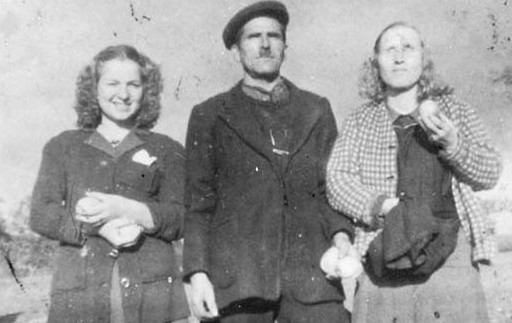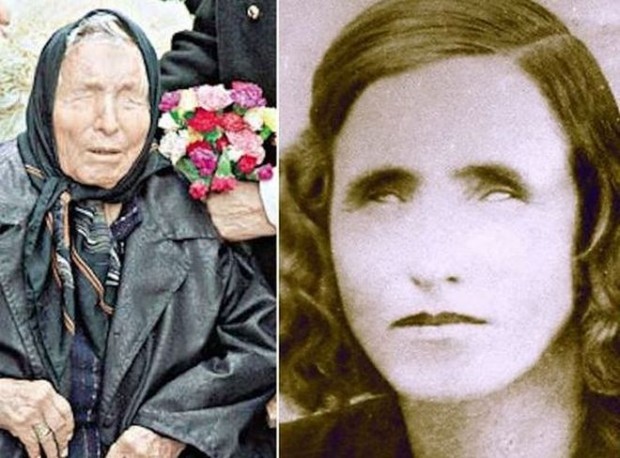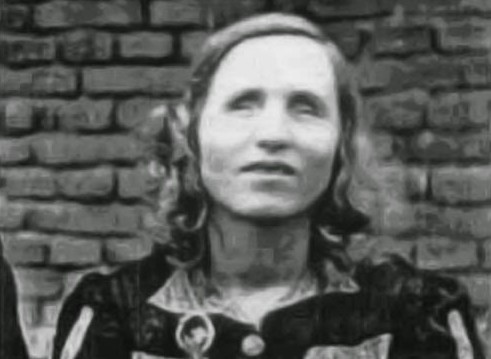Vanga's Mysterious Life Story - Part 1: Childhood and Family
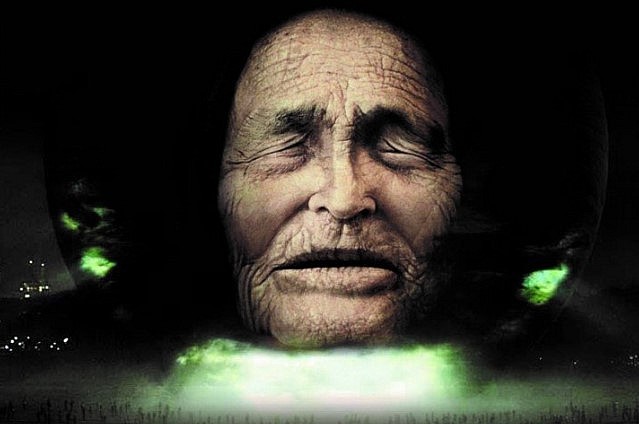 |
| Vanga Life Story - Childhood and Parents |
Who is Baba Vanga?Vanga is a famous Bulgarian seer and herbalist. She was born on January 31, 1911 and died on August 11, 1996. Her birth name was Vangelia Pandeva Dimitrova, after marriage changed to Vangelia Gushcherova. She was blind since the age of 12 and lived most of her life in the Rupite region, in the Kozhuh Mountains, Bulgaria. During her lifetime, many people from all over the world came to her for treatment or advice about problems in life, and to predict the future. |
PART 1: VANGA'S PARENTS, EARLY CHILDHOOD
Vanga Parents
| Vanga's early childhood years are marked by suffering. Her mother died while she was still a young child, and her father was mobilized in the Bulgarian army during the First World War. During this period he lived under the supervision of his neighbors. In her childhood, Vanga was an ordinary girl and showed no signs of supernatural abilities. She liked to play medicine and prescribed various "medicinal" herbs to her friends. The father remarries and the daughter helps with the housework and works in the fields. |
In his youth, Mr. Pande Surchev joined the armed insurgency to fight against the domination of the Osman Empire. He was captured by the Turks and sentenced to life in prison. In the “Edi kule” prison, he was brutally tortured and thought he had lost hope of being saved, but in 1908 young Turks declared Turkey a constitutional monarchy, and the new government released release prisoners.
Pande returned to his hometown Novo-Selo, but there were no relatives left. Parents passed away without seeing their son, and the younger brother ran away and disappeared. Soon after, hearing that in the city of Strumitsa, the commune was distributing the houses left behind by the Turks to the migrants, Pande set out there in search of happiness.
He was assigned an old house located on the outskirts of the city.
The neighborhood called "Svetiko" is located next to the church of the Fifteen Martyrs. The houses here are built of identical bricks, looking very old. “Svetiko” is more like an abandoned village than a city suburb. The streets are narrow, muddy and dirty, at night, nothing to see. Small courtyards surrounded by hedges of thorn trees. In the yard, the animals roam freely, at night they are locked in the lower floors of the houses or in the rooms. All residents have recently moved to the city from neighboring villages in search of work. They are mainly farmers, craftsmen or traders.
Prominent in the neighborhood were a few rowdy Zigan families and a Turkish family named Gyul-baba who did not want to return home. People joked that he didn't want to go because the rose garden wouldn't allow it. In fact, in his garden, roses bloom from early spring to late autumn, spreading their fragrance throughout the region.
Pande begins to adjust to her new place. The youthful body quickly recovered after years of imprisonment and tribulation. He bought a small piece of land and worked hard. He is a gentle guy, loves to work, lives in harmony with his neighbors, who are also migrants like him.
For a time, Pande was single. But then he fell in love with a gentle and agile girl named Paraskeva. She has a slim body, but is agile and cute. Pande proposed marriage and she accepted. Soon they began family life. The young wife has a cheerful disposition, lives neatly, cleanly and knows how to nurture her family home. She helps her husband with farming and often supports him.
Read More: Vanga's Mysterious Prophecy for Famous Russian Artists
'Vangelia' almost died when she was born
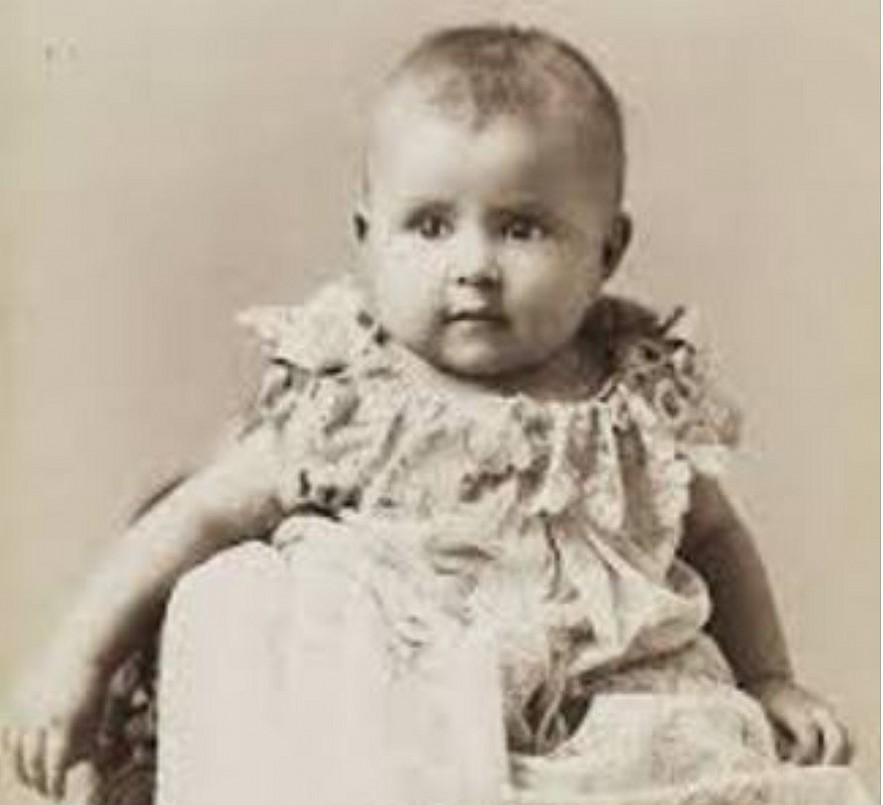 |
| Vanga was born in Strumica, then in the Ottoman Empire (present-day Republic of Macedonia).Her real name was Vangelia Pandeva Dimitrova .She was a premature baby who suffered from health complications. In accordance with local tradition, the baby was not given a name until it was deemed likely to survive |
On January 31, 1911, their first daughter was born.
She was born prematurely at only 7 months and was very weak, her fingers and toes fused together, and did not cry out. Even the experienced old people did not believe that the little girl could survive. People wrapped the baby in a piece of woolen cloth and placed it next to the stove.
Some time later, which was in March, the baby suddenly cried out in the middle of the night. The wise old ladies explained to the worried mother that the baby was actually born at that very moment.
In Strumitsa, it is customary not to name a child unless it is certain that he will survive. Also according to ancient custom, parents or other relatives should not name the child. Someone in the family had to go out into the street and ask the first person to name it.
And in the morning after the little girl began to cry, her grandmother went out into the street and asked the first woman she met to name the newborn baby. She named it "Andromaha". But the grandmother did not like the name, she went to see another woman passing by; she named it "Vangelia". This Greek name means "bearer of good news". And although this is a "foreign" name, in Strumitsa it is very popular, and the grandmother agrees to give it to the baby.
In the family, everyone calls her Vanga. She grew stronger and stronger and soon, looked just like her peers. When Vangelia was three years old, her mother died in childbirth for the second time. The unhappiness doesn't stop there. World War I broke out, and in 1915, her father was drafted into the Bulgarian army.
A very gentle and kind Turkish woman named Asanitsa, who lived next door, took her in. Years went by, life was full of hardships and hardships. People were waiting for Vanga's father to return, but three years have passed and he still has no sound. People began to think that he was dead?.. Maybe, she was an orphan of both parents?
However, all skepticism turned out to be in vain. The father soon returned alive and well. But not only his daughter but also the neighbors had a hard time recognizing him because he was so thin and emaciated.
Vanga and her father continued to live in the old house. But Mr. Pande's single life is not easy. And Vanga - the girl with chestnut hair and blue eyes - is 7 years old. Being hyperactive and capricious, she needs a mother's love and care. The father was very worried about Vanga's future.
Play the role of 'The Blind'Vanga is 11 years old. She works hard to help with the housework. Watching you while thinking of games to play by yourself. But one of her "magical" games had her parents worried. Its unusual in that she plays a "blind person". For example, she leaves something on the street or next to the house and starts looking for it, groping everywhere, like a blind person. Parents tried to ban Vanga from playing that game, but she didn't listen. |
Family's Disaster, even though the War is Over
Although the war is over, the people are still afraid and feel insecure. A new government was established in Strumitsa, which passed into the hands of a Serbian mayor. Now the people of the city have to speak and write in Serbian. Local officials apply strict rules and various taboos. Many citizens have difficulty understanding complex commands, and look anxiously into the future. Some people leave their homeland. Even Mr. Pande thought it best to leave, but for the sake of his daughter did not decide to do so.
But children have their own lives. In Mr. Pande's house, there was always the sound of children playing. The children in the area fell in love with the games Vanga presented thanks to their lively and funny personality. Her favorite game is called "hospital". Vanga plays the role of "medicine". "Patient" waits in the yard, and medicine is the grass that grows all around to help cure various "diseases".
Like her mother, she loves to be clean and tidy. She also asked her friends to sweep the yard after "curing". After sweeping, Vanga asked everyone to sit around him on a hemp mat. The children impatiently waited for this moment. And Vanga began to tell them countless stories of her own making up. They all held their breath and listened.
Mr. Pande alone struggled to manage the economy and educate his daughter. He often thought about walking again. It cannot be said that he was a rich bunch: he was poor, widowed, and had to raise a small child. But luck smiled on him. Soon, one of the most beautiful girls in the city, Tanka Georgievna, became his wife. An unfortunate event in the Tanka family became an opportunity for him. Tanka was about to marry a Bulgarian officer, but the marriage fell apart because of an unreasonable directive from the Serbian leadership. Accordingly, all women more or less connected to Bulgarian officers or soldiers must immediately leave Strumitsa with their families. To avoid scandal and banishment from the city, Tanka accepted Pande's marriage proposal and married him.
The young wife became a good housewife and devoted mother, but her husband had no reason to disappoint her, he was a kind, caring and hardworking person. Things couldn't have been better. Family atmosphere is peaceful and harmonious. Thanks to Mr. Pande's hard work and patience, the family business grew more and more, the family's land area gradually expanded to 9 hectares. During the harvest season, when family members could not work, Mr. Pande even had to hire workers. Everyone respects him.
But the peace and happiness did not last long. Dark clouds covered the sky of Strumitsa again. The new leadership tried to turn the locals into Serbs. A guy named Popchevsky became the effective executioner of this operation. He was ordered to decide the fate of the people according to his will. And immediately began to "handle" the people of Bulgarian origin or those who sympathized with the Bulgarian people. Popchevsky did not ignore Pande's past. Once, while harvesting crops, Pande was arrested and taken to the fort. He was beaten and tortured, then returned home, but soon his land was confiscated.
The disaster was so great that Mr. Pande's family could not recover for many years and fell into poverty. Mr. Pande had no choice but to go to work. An event as joyful as giving birth, in their new circumstances, only added to the burden. In 1932, Mrs. Tanka gave birth to a baby boy, named Vasil. The father went to herd cattle in a neighboring village, then moved to another village…He couldn't get up anymore.
During that time, Mr. Pande's younger brother, Konstadin, learned about his brother's family situation. Konstadin's fate was more fortunate: he became rich, married, but God did not give him children. Knowing that his brother's family was in trouble, Konstadin invited them to move in with him. "What's to suffer in Strumitsa, better come and help me herd, I won't help you." The invitation was accepted, and in 1923 the family moved back to Novo-Selo.

